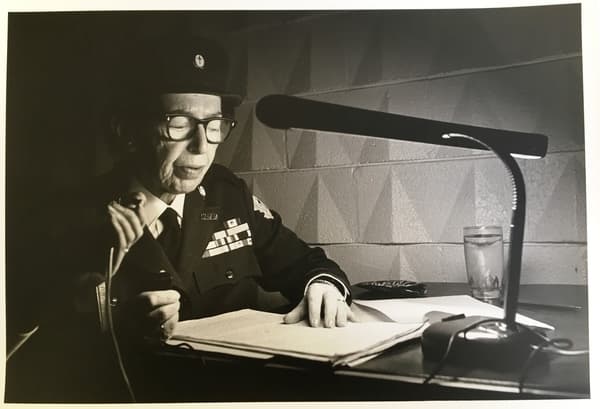Each November 28, thousands of Canadians celebrate the birthday of beloved humanitarian, Dr. Lotta Hitschmanova (1909-1990). This year, there is a second celebration, as the Canadian Unitarian Council celebrates its own 60th anniversary this week. The two celebrations have much in common.
 In Part I of the “Lotta Unitarian” story, I asked the question how a World War II refugee, born into a Jewish family in Prague, Czechoslovakia, could became such a revered figure (a “saint”) for Unitarians in Canada?
In Part I of the “Lotta Unitarian” story, I asked the question how a World War II refugee, born into a Jewish family in Prague, Czechoslovakia, could became such a revered figure (a “saint”) for Unitarians in Canada?
Here’s a recap of the “Lotta Unitarian story,” as sketched in by Lotta’s biographer, Clyde Sanger:
- In 1941, Lotta fainted from hunger on a Marseilles street and received treatment from a medical clinic established by the American Unitarian Service Committee (USC).
- In July 1942, Lotta joined hundreds of refugees on a 2,400 ton banana boat that sailed from Lisbon to New York via Casablanca, Bermuda and Mexico. Lotta visited the USC headquarters in Boston, found her way to Montreal, and two weeks later to Ottawa, where she lived the rest of her life.
- In early 1945, the American USC discussed the possibility of Lotta becoming their representative in Czechoslovakia, and encouraged her to establish a Canadian branch of the USC.
- The congregations of six Unitarian churches in Canada – in Ottawa, Montreal, Toronto, Hamilton, Winnipeg and Vancouver – also began discussing the establishment of a USC in Canada, to offer aid to war-torn, post-World War II European communities and refugees.
- On August 30, 1945, the “The Unitarian Service Committee of Canada Fund” was officially recognized. Fundraising was limited at first to Unitarian members and supporters.
- Then, on September 6, 1945, the American USC in Boston appointed Lotta as executive secretary for Canada. In February 1946, the fundraising limitation was removed and anyone (Unitarian or non-Unitarian) could contribute.
- The links between the Canadian and American USCs were close, Lotta’s salary was paid by Boston, and they helped with the printing of ten thousand copies of the initial brochure.
- In 1948, ties between the two USCs were dissolved, “without rancour” as Lotta’s biographer Clyde Sanger has put it, and USC Canada’s life as an independent, non-sectarian agency began.
These were humble beginnings indeed, but very quickly, under Lotta’s charismatic leadership, USC Canada grew to become one of Canada’s most respected international development and social justice organizations. [NB: a few years ago, USC Canada changed its name to SeedChange to better reflect its work with seed-saving farmers around the world.]
Throughout its existence, Unitarians have always had a strong influence on USC Canada – as volunteers, Board members, donors, and by supporting policy campaigns.
Less well known perhaps is the fact that Lotta and her USC Canada work also had a very important, historical influence on Unitarians too!
As the late Rev. Dr. Phillip Hewett put it in his book, “Unitarians in Canada”:
In 1950, Unitarians were not well organized across Canada. Along came Lotta and the USC, which “gave Canadian Unitarians a sense of involvement in a project the relevance and usefulness of which were patently beyond argument.”
And Vancouver Minister Rev. Dr. Steven Epperson wrote the following words in the Spring 2010 edition of the Canadian Unitarian newsletter:
“Between 1945 and 1955, through the work of Unitarians and the Unitarian Service Committee under the leadership of Lotta Hitschmanova, we committed ourselves to assist war-ravaged survivors in Europe and Asia. By focusing on a single concerted decade-long service effort, Canadian Unitarians discovered who and what they were as a national movement, and people across Canada knew us.”
 And it must have been a source of great pride for Unitarians in the 50s, 60s and 70s, to hear Lotta conclude her ubiquitous radio and TV announcements with these words: “Please give generously to the Unitarian Service Committee, 56 Sparks Street, Ottawa 4.”
And it must have been a source of great pride for Unitarians in the 50s, 60s and 70s, to hear Lotta conclude her ubiquitous radio and TV announcements with these words: “Please give generously to the Unitarian Service Committee, 56 Sparks Street, Ottawa 4.”
And no doubt, this would have been a huge unifying force for such a small religious community spread across such a vast territory. And we might imagine that it could also have played some part in the energy that led up to the establishment of their national organization in 1961.
So let’s raise a glass to Lotta on November 28 and also wish the Canadian Unitarian Council a very happy 60th birthday too!
David Rain

Cheers to a remarkable woman and humanitarian!
Congratulations Canadian Unitarian Council on 60 years!